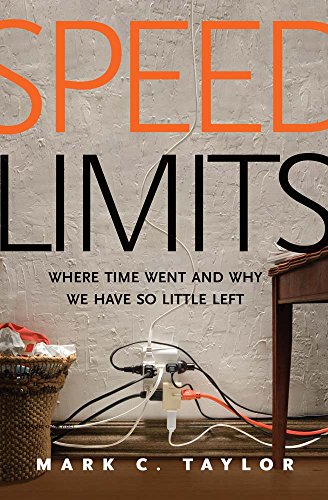Items related to Speed Limits: Where Time Went and Why We Have So Little...

Synopsis
A leading thinker asks why “faster” is synonymous with “better” in our hurried world and suggests how to take control of our runaway lives
We live in an ever-accelerating world: faster computers, markets, food, fashion, product cycles, minds, bodies, kids, lives. When did everything start moving so fast? Why does speed seem so inevitable? Is faster always better?
Drawing together developments in religion, philosophy, art, technology, fashion, and finance, Mark C. Taylor presents an original and rich account of a great paradox of our times: how the very forces and technologies that were supposed to free us by saving time and labor now trap us in a race we can never win. The faster we go, the less time we have, and the more we try to catch up, the farther behind we fall. Connecting our speed-obsession with today’s global capitalism, he composes a grand narrative showing how commitments to economic growth and extreme competition, combined with accelerating technological innovation, have brought us close to disaster. Psychologically, environmentally, economically, and culturally, speed is taking a profound toll on our lives.
By showing how the phenomenon of speed has emerged, Taylor offers us a chance to see our pace of life as the product of specific ideas, practices, and policies. It’s not inevitable or irreversible. He courageously and movingly invites us to imagine how we might patiently work towards a more deliberative life and sustainable world.
"synopsis" may belong to another edition of this title.
About the Author
Mark C. Taylor is professor and chair, Department of Religion, Columbia University. He lives in Williamstown, MA and New York, NY.
"About this title" may belong to another edition of this title.
FREE shipping within U.S.A.
Destination, rates & speedsBuy New
View this itemUS$ 33.51 shipping from United Kingdom to U.S.A.
Destination, rates & speedsSearch results for Speed Limits: Where Time Went and Why We Have So Little...
Speed Limits: Where Time Went and Why We Have So Little Left
Seller: Your Online Bookstore, Houston, TX, U.S.A.
hardcover. Condition: Good. Seller Inventory # 030020647X-3-34702431
Quantity: 1 available
Speed Limits: Where Time Went and Why We Have So Little Left
Seller: Wonder Book, Frederick, MD, U.S.A.
Condition: Very Good. Very Good condition. Very Good dust jacket. A copy that may have a few cosmetic defects. May also contain light spine creasing or a few markings such as an owner's name, short gifter's inscription or light stamp. Seller Inventory # H19A-02744
Quantity: 1 available
Speed Limits: Where Time Went and Why We Have So Little Left
Seller: ThriftBooks-Atlanta, AUSTELL, GA, U.S.A.
Hardcover. Condition: Very Good. No Jacket. Former library book; May have limited writing in cover pages. Pages are unmarked. ~ ThriftBooks: Read More, Spend Less. Seller Inventory # G030020647XI4N10
Quantity: 1 available
Speed Limits: Where Time Went and Why We Have So Little Left
Seller: ThriftBooks-Dallas, Dallas, TX, U.S.A.
Hardcover. Condition: Very Good. No Jacket. May have limited writing in cover pages. Pages are unmarked. ~ ThriftBooks: Read More, Spend Less. Seller Inventory # G030020647XI4N00
Quantity: 1 available
Speed Limits: Where Time Went and Why We Have So Little Left
Seller: ThriftBooks-Atlanta, AUSTELL, GA, U.S.A.
Hardcover. Condition: Very Good. No Jacket. May have limited writing in cover pages. Pages are unmarked. ~ ThriftBooks: Read More, Spend Less. Seller Inventory # G030020647XI4N00
Quantity: 1 available
Speed Limits: Where Time Went and Why We Have So Little Left
Seller: ThriftBooks-Dallas, Dallas, TX, U.S.A.
Hardcover. Condition: Very Good. No Jacket. Former library book; May have limited writing in cover pages. Pages are unmarked. ~ ThriftBooks: Read More, Spend Less. Seller Inventory # G030020647XI4N10
Quantity: 1 available
Speed Limits: Where Time Went and Why We Have So Little Left
Seller: ThriftBooks-Reno, Reno, NV, U.S.A.
Hardcover. Condition: Very Good. No Jacket. May have limited writing in cover pages. Pages are unmarked. ~ ThriftBooks: Read More, Spend Less. Seller Inventory # G030020647XI4N00
Quantity: 1 available
Speed Limits: Where Time Went and Why We Have So Little Left
Seller: ThriftBooks-Atlanta, AUSTELL, GA, U.S.A.
Hardcover. Condition: Very Good. No Jacket. Former library book; Missing dust jacket; May have limited writing in cover pages. Pages are unmarked. ~ ThriftBooks: Read More, Spend Less. Seller Inventory # G030020647XI4N11
Quantity: 1 available
Speed Limits: Where Time Went and Why We Have So Little Left
Seller: ThriftBooks-Reno, Reno, NV, U.S.A.
Hardcover. Condition: Very Good. No Jacket. Former library book; May have limited writing in cover pages. Pages are unmarked. ~ ThriftBooks: Read More, Spend Less. Seller Inventory # G030020647XI4N10
Quantity: 1 available
Speed Limits: Where Time Went and Why We Have So Little Left
Seller: ThriftBooks-Dallas, Dallas, TX, U.S.A.
Hardcover. Condition: Very Good. No Jacket. Missing dust jacket; May have limited writing in cover pages. Pages are unmarked. ~ ThriftBooks: Read More, Spend Less. Seller Inventory # G030020647XI4N01
Quantity: 1 available

